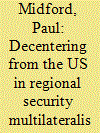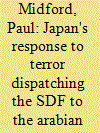| Srl | Item |
| 1 |
ID:
050579


|
|
|
|
|
| Publication |
2004.
|
| Summary/Abstract |
This paper considers whether an alliance can have a reassurance effect on a third-party. It uses hypotheses derived from balance-of-malevolence theory. Using the revised 1997 US-Japan Defence guidelines as a primary case, Chinese reactions are found to provide greater support for balance-of malevolence theory. Side evidence from Japan's decision in the early 1990s to begin deploying troops overseas to participate in humanitarian and UN peacekeeping operations, and its dispatch of naval ships to the Indian ocean in the wake of 9-11, confirm the centrality of Chinese concerns about Japan' disposition as amilitary power and the reassurance value of the US alliance and 'containment frameworks' such as UN peacekeeping. This also suggests that the demonstrarion effect of benign overseas deployments ca be effective in overcoming negative attributions about a state's disposition as a military power.
|
|
|
|
|
|
|
|
|
|
|
|
|
|
|
|
| 2 |
ID:
159422


|
|
|
|
|
| Summary/Abstract |
This article poses the question of why, after having consistently pursued an isolationist strategy of avoiding security ties with partners other than the US, and having followed the US in opposing regional security multilateralism, did Japan suddenly reverse course and get out in front of the US with its first post-war regional security initiative. This article addresses this question by tracing the internal debates, policy process and motivations that drove Japan to reverse its position, a process that transformed Japan into the leading champion of regional security multilateralism in East Asia.
|
|
|
|
|
|
|
|
|
|
|
|
|
|
|
|
| 3 |
ID:
118184


|
|
|
|
|
| Publication |
2012.
|
| Summary/Abstract |
The rise of China has led to a spate of scholarly and journalistic speculation about the future of a liberal world order. Apparently, the rise of a nondemocratic, Asian rival to US hegemony potentially undermines the growth of democracy throughout the system. Many see a resource-hungry China engaging itself globally out of purely self-interested motives, and Chinese business and aid offer a viable alternative to Western influence. Using the Stockholm Institute for Peace Research's (SIPRI) data on arms transfers since the end of the Cold War, we test the proposition empirically by assessing the nature and strength of Chinese politico-military support, measured as conventional arms transfers, globally and to African regimes. In short, we find that China relative to the United States transfers greater amounts of arms to democracies rather than autocracies, whereas the United States seems to prefer more autocratic regimes, despite rhetoric that claims an ethical foreign policy. The same result holds when we assess this relationship using human rights data. Moreover, Chinese arms transfers to countries suffering civil wars are much lower than the United States'. The findings are robust to the inclusion of several control variables and alternative estimation techniques. The findings show that popular perceptions about China's role in Africa do not match reality, particularly when assessed against the current hegemon's behavior.
|
|
|
|
|
|
|
|
|
|
|
|
|
|
|
|
| 4 |
ID:
140409


|
|
|
|
|
| Summary/Abstract |
This article addresses Japan’s role in maritime security in the South China Sea. It identifies Tokyo’s three main policy tools: regional multilateralism, ODA, and JCG aid to littoral states in the form of equipment and capacity building. Barring a major external shock Tokyo will continue playing a more active but low-key role.
|
|
|
|
|
|
|
|
|
|
|
|
|
|
|
|
| 5 |
ID:
059433


|
|
|
| 6 |
ID:
159420


|
|
|
|
|
| Summary/Abstract |
During the cold war the United States was overwhelmingly central in Japan's security policy. Japan hosted US bases and the Self-Defense Forces held joint exercises with the US military, even while shunning contacts with other militaries. Japan essentially refused even to discuss security with its neighbors. Special exceptions were made for the United States in otherwise sweeping policies, such as the exception for the United States in Tokyo's ban on weapons exports and co-development. Since the end of the cold war, Japan's security policy has undergone a little noticed transformation: it has steadily moved away from being centered on the United States as its sole security partner. Tokyo has initiated bilateral security dialogues with its Asian neighbors and assumed a leadership role in promoting regional multilateral security cooperation as a supplement to the US alliance. Japan has begun building bilateral security partnerships with a range of countries and actors, from Australia and India to the European Union. Paradoxically these changes have occurred even as the US–Japan alliance has strengthened. The articles in this special issue examine these new security ties with states and multilateral organizations, and other changes in policy that have made the United States less ‘special,’ such as by allowing arms exports to other actors.
|
|
|
|
|
|
|
|
|
|
|
|
|
|
|
|